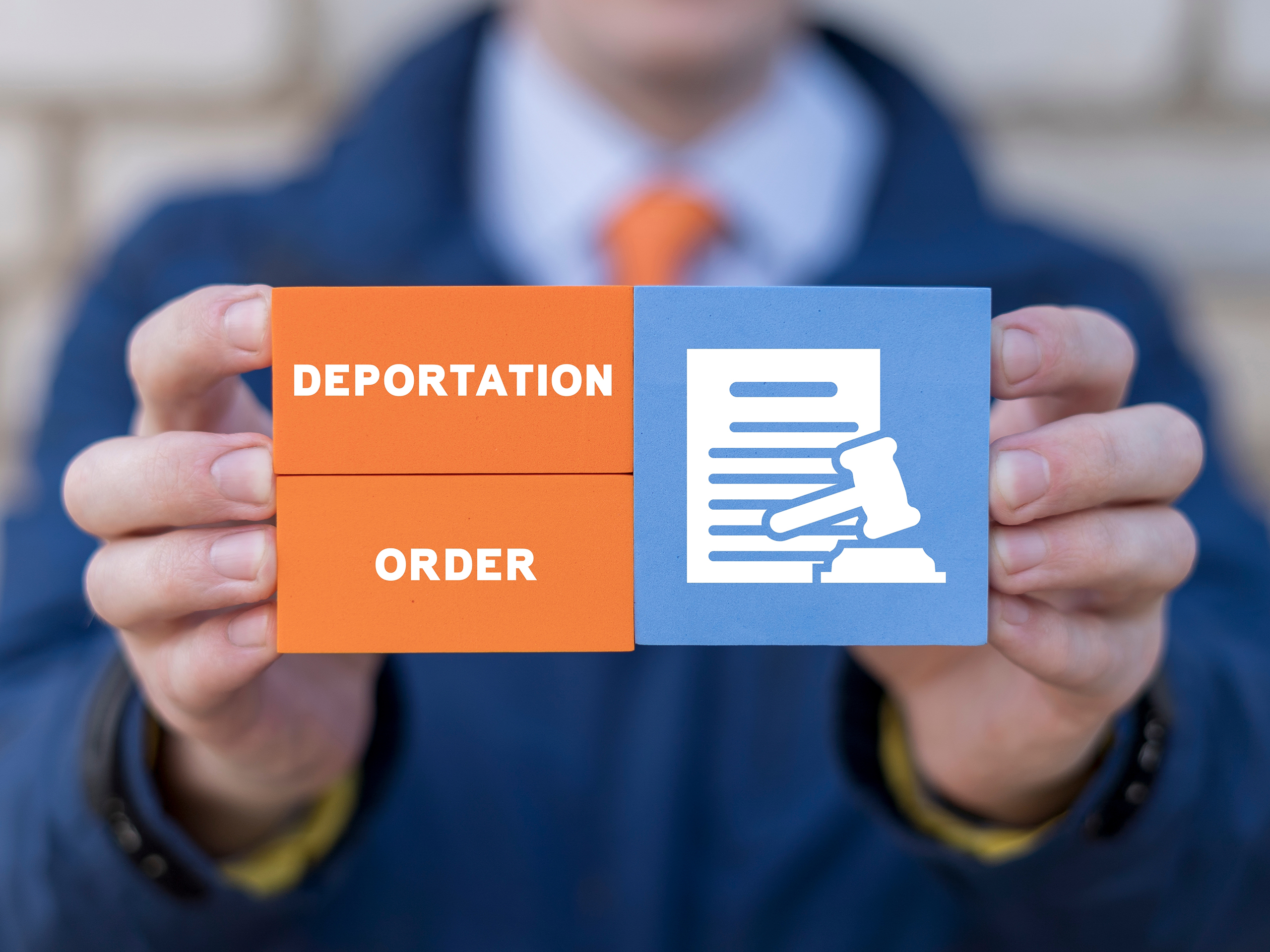Appealing a UK Deportation Order

Facing a UK deportation order means your future, and often your family life, is at risk. You may have lived here for years, built a home, raised children, or turned your life around. But one letter from the Home Office threatens to undo everything. You must act fast, or face removal.
This guide explains how to appeal a UK deportation order and stop it from being enforced. We cover who can be deported, the legal grounds for appeal, deadlines, tribunal hearings, exemptions, and how Cromwell Wilkes can help. If you’re facing removal, knowing your rights could be the difference between staying and starting over elsewhere.
What Is a UK Deportation Order?
A deportation order is a formal Home Office decision to remove a non-British citizen. It is usually issued after serious criminal offences or for public interest. Unlike removal for overstaying, deportation orders carry long bans and require strong legal grounds to challenge.
Legal Basis for Deportation
The legal basis for UK deportation orders sits under the Immigration Act 1971 and the UK Borders Act 2007. A deportation order will be automatically issued for any foreign national who receives a prison sentence of 12 months or more. It may also be used when the Home Secretary believes your presence is not conducive to the public good.
This includes cases involving public safety, national security, or serious harm to society. A deportation order cancels all existing immigration permission and bars the person from re-entering the UK unless the order is formally revoked.
Deportation vs Removal
Deportation and removal are legally distinct under UK immigration law. Deportation typically follows criminal convictions or threats to national security, while removal is used for immigration rule breaches like overstaying or working illegally. Deportation is much more severe in both legal weight and long-term consequences.
Unlike administrative removal, a deportation order enforces a mandatory re-entry ban and cannot be bypassed without appeal. It also restricts future visa applications and may result in immigration detention. Removal cases may allow for re-entry sooner, but deportation creates formal legal barriers that last for years.
Who Can Be Deported from the UK?
Not all migrants face deportation. The Home Office targets serious offenders, persistent lawbreakers, and those seen as threats. However, there are grounds for appeal. Factors such as family ties, long residence, and legal status do not automatically prevent deportation, but they can be argued as reasons why removal would be unduly harsh. Each case is assessed individually, making legal representation critical when challenging a deportation decision.
Criminal Offences and Public Safety
Foreign nationals sentenced to 12 months or more in prison are automatically subject to deportation under the UK Borders Act 2007. In addition, those considered persistent offenders, or where the Secretary of State decides deportation would be in the public interest, may also face removal.
Persistent offending—even without a single long sentence—can also trigger deportation if the person is seen as a continued risk to society. In addition, national security threats justify deportation regardless of sentence length, and these cases often involve terrorism or serious public order concerns.
Immigration Law Breaches
Overstaying a visa or working illegally does not usually result in a deportation order. These are treated as breaches of immigration control and typically lead to administrative removal, not formal deportation. Removal is a simpler process with less severe long-term consequences.
The key difference lies in the justification. Deportation applies when a foreign national is sentenced to 12 months or more in prison, regardless of the nature of the offence. In such cases, a deportation order will normally follow. The seriousness of the crime may affect sentencing, but the length of the sentence is the legal trigger.
Who Is Exempt From Deportation
Some individuals are legally exempt from deportation. British citizens and those with the Right of Abode cannot be deported under any circumstances. This includes many Commonwealth citizens with historic ties to the UK who benefit from special protections under immigration law.
Long residence alone does not exempt someone from deportation. Even individuals who have lived in the UK for decades remain liable if they commit a serious offence. The closest legal protection arises under Article 8 of the European Convention on Human Rights (private life grounds).
This exception may apply where the person has been lawfully resident in the UK for most of their life, is socially and culturally integrated, and would face very significant obstacles to reintegration in their country of origin.
Legal Grounds to Appeal a Deportation Order
To appeal a deportation order, you must show it breaches your human rights or asylum protections. UK law allows deportation appeals only on specific legal grounds, mainly Articles 3 and 8 of the European Convention on Human Rights. These legal protections form the basis of most successful deportation appeals.
Human Rights Violations (Article 3 & Article 8)
Article 3 protects individuals from deportation to countries where they would face torture, inhuman, or degrading treatment. In practice, this protection is usually raised through an asylum claim. Where a foreign national offender submits an asylum application, they cannot be deported until that claim has been fully decided.
Article 8 protects the right to family and private life, but the test is strict. For deportation appeals involving children or partners, it must be shown that removal would be unduly harsh both if the family were to remain in the UK without the offender (“stay scenario”) and if they were to relocate abroad with them (“go scenario”). Where the sentence is four years or more, the appellant must demonstrate not only undue harshness but also very compelling circumstances that go beyond that threshold.
Successful appeals under these rights rely on detailed evidence, including relationships, community ties, medical needs, or risks in your home country. The tribunal weighs public safety against personal rights and considers whether deportation strikes the right balance under UK and European human rights law.
Asylum and Refugee Grounds
If deportation would place you at risk in your home country due to your race, religion, political opinion, or membership of a social group, you may qualify for asylum. Refugee protection blocks deportation where persecution is likely or ongoing.
The UK cannot legally deport someone with a valid asylum claim. Deportation in such cases violates both the Refugee Convention and Article 3 of the ECHR. Even if your asylum claim was previously refused, new or stronger evidence can reopen protection grounds.
You must show a credible risk of harm—this includes personal threats, systemic discrimination, or political persecution. Country expert reports, news articles, and testimonies can strengthen the case. A successful appeal on asylum grounds not only halts deportation but may lead to refugee status or humanitarian protection.
How to Appeal a Deportation Order in the UK
You must act fast. Appeals must be filed within strict deadlines after receiving the Home Office decision. If accepted, your appeal suspends the deportation until the Tribunal makes a ruling. Missing a deadline or filing incomplete paperwork can cost you the right to stay in the UK.
Appeal Deadlines and Filing
If you’re in the UK when the deportation decision is made, you must file your appeal within 14 days. If the decision is made while you’re abroad—or you’re removed before filing—you have 28 days from departure. These deadlines are strict and enforced by the First-tier Tribunal.
You’ll need to complete the appropriate tribunal appeal form and include the appeal fee. The most common is Form IAFT-1 for human rights appeals. Delayed filings are rarely accepted and may permanently remove your ability to challenge the deportation. Early legal advice is essential.
Evidence and Appeal Bundle
Your appeal must be supported by a comprehensive set of documents known as an appeal bundle. This includes witness statements from you and your family, proof of relationships, tenancy records, letters from schools or employers, and other documents showing your ties to the UK and risk abroad.
Expert reports can be powerful additions, especially medical opinions or country condition reports that support your case. Consistency and clarity matter. Missing or conflicting evidence weakens your argument. A strong, well-structured bundle gives the tribunal confidence in your case and raises your chances of success.
Tribunal Hearing and Decision
Most deportation appeals are decided at an oral hearing before an immigration judge. You’ll attend the First-tier Tribunal, usually with your lawyer. You will give evidence, answer questions, and present your case in person. The Home Office will also challenge your appeal and question your claims.
The judge reviews all evidence from both sides before making a decision. You usually receive the result in writing a few weeks after the hearing. If successful, the deportation order is revoked. If revoked, you may need to consider further legal action or voluntary departure.
Appealing on Family and Private Life Grounds
Deportation can be challenged under Article 8 if it would break up families or uproot individuals with deep ties to the UK. You must prove the effect on your partner, child, or life here is “unduly harsh.” Strong evidence is required to show that removal would cause disproportionate harm.
If You Have Children in the UK
If you are a parent facing deportation, you can appeal based on your child’s rights. You must prove you have a genuine and ongoing relationship with a child living in the UK. This includes regular contact, shared living arrangements, or financial and emotional support.
To stop deportation, you must show that forcing your child either to leave the UK with you or to remain without you would be unduly harsh. This is a high threshold, and it becomes even higher if the sentence exceeds four years. Factors such as the child’s British citizenship or long residence in the UK can strengthen the argument, but success depends on proving a level of impact well beyond ordinary hardship.
If You Have a British or Settled Partner
If you are in a long-term relationship with a British citizen or someone with settled status, you can appeal deportation on family life grounds. You’ll need to show the relationship is genuine and was not formed while you were in the UK unlawfully or temporarily.
You must also prove that relocating abroad is not a viable option for your partner, whether due to health, language, finances, or lack of ties. Finally, show that separation would cause exceptional hardship beyond normal emotional distress. Written statements and joint evidence help prove this.
If You Have Long Residence
Appeals based solely on long residence and private life are extremely rare without family life connections. Under Article 8 private life grounds, success requires showing that the UK has been your home for most of your life, that you are socially and culturally integrated here, and that there would be very significant obstacles to your reintegration in your country of origin. Evidence such as school attendance, employment history, community involvement, and cultural assimilation may support the case, but without family life factors, it is seldom sufficient to block deportation.
What Happens If You Lose the Appeal?
If the tribunal dismisses your appeal, you may still have legal options. Consider appealing to the Upper Tribunal, judicial review, or voluntary departure. Losing does not always mean immediate removal. Acting quickly—and with legal guidance—can protect your position and reduce long-term consequences such as bans or enforced return.
Upper Tribunal Appeal
If your First-tier Tribunal appeal is refused, you can apply to appeal to the Upper Tribunal. You must file within 14 days and identify a specific legal error in the original decision. The appeal must show that the law was misapplied or that your case was handled unfairly.
Permission is required before the case proceeds. If permission is granted, the Upper Tribunal may overturn the decision or order a new hearing. The process is technical and requires expert legal submissions. Without professional support, most Upper Tribunal applications fail at the permission stage.
Judicial Review
If you no longer have a right of appeal, you may be able to pursue judicial review. This legal action challenges the lawfulness of a decision, such as if appeal rights were wrongly denied or the process was procedurally unfair.
Judicial reviews do not re-examine facts or rehear your case. They focus strictly on whether the Home Office or Tribunal acted within the law. The application must be filed within 3 months of the decision. Judicial review is complex and often requires barrister involvement for success.
Voluntary Departure and Return Bans
If you’ve exhausted all legal remedies, leaving the UK voluntarily may reduce the severity of your re-entry ban. Forced removal typically results in a 10-year re-entry prohibition, while voluntary return may limit this to as little as 1 or 2 years, depending on the case.
Voluntary departure allows you to plan your exit, protect your dignity, and retain better chances of returning legally in the future. Immigration lawyers can guide you on timing, paperwork, and future re-application options. Avoiding forced removal protects long-term immigration prospects.
Appeal a Deportation Order with Cromwell Wilkes
Facing a deportation order is a race against time. Cromwell Wilkes brings expert immigration lawyers who know these cases inside out. We craft powerful human rights arguments under Articles 3 and 8, assemble compelling evidence, and ensure your deportation appeal meets every tribunal deadline. Your future in the UK depends on a strong legal team—ours is ready.
Why Choose Us:
- Expert representation in deportation appeals and exemptions
- Strategic planning using human rights law
- Swift action on time-sensitive appeals
Please complete this form with as much information as possible for your consultation. This will enable your appointed Cromwell Wilkes lawyer to provide you with the best service and support. Rest assured that we will prioritise your inquiry, and you should receive a response within 24-48 hours.
FAQ – Appealing a Deportation Order UK
What is the difference between deportation and removal in the UK?
Deportation follows criminal or national security concerns. Removal applies to immigration rule breaches, such as overstaying. Deportation carries a re-entry ban and requires a formal appeal, while removal may allow for faster re-entry depending on the case.
Can I stay in the UK while appealing against deportation?
Yes. If you appeal within the legal deadline, deportation is usually suspended until the tribunal makes a decision. This gives you time to prepare and present your case.
How long does a deportation appeal take?
Most appeals take 6 to 12 months. Timelines depend on the complexity of your case, the strength of your evidence, and delays within the immigration tribunal system.
What happens if I lose my deportation appeal?
You may still be able to appeal to the Upper Tribunal or apply for a judicial review. If no further legal options remain, voluntary departure may reduce future re-entry bans.
Can I appeal deportation without a lawyer?
It is legally possible to represent yourself, but exceedingly rare for unrepresented appeals to succeed. Deportation law is highly complex, and the burden of proof is demanding. Having expert legal representation greatly increases your chances of success.
CONTACT CROMWELL WILKES IMMIGRATION LAWYERS
CONTACT CROMWELL
WILKES IMMIGRATION
LAWYERS
Cromwell Wilkes is ready to assist if you need expert work visa legal advice. We offer consultations by phone or in person at our London office.
Contact us today to discuss your situation and learn how we can help you achieve your immigration goals.
If you plan to launch, grow, or invest in the UK, expert legal support for your UK work visa application can make all the difference.




